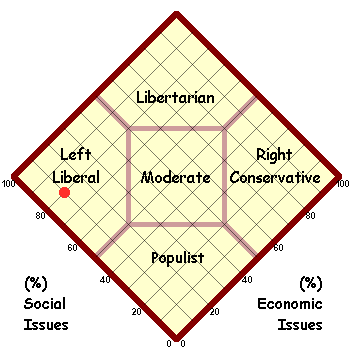In terms of domestic issues* (by which I mean mostly economic issues; I think identity politics, while not insignificant, can also be a bit of a distraction), I'm using the term "centrist" not to mean "between the two [US institutional] parties", but rather "vaguely in the center of a spectrum that ranges from essentially stateless liberty (think anarcho-capitalism) to dictatorship of the proletariat". While I'm not sure "centrist literally means" between the platforms of D and R, I'm happy to use "moderate" instead for the ideological position to which I'm referring.
*(I was, by the way, being a lot more simplistic with respect to foreign policy, meaning simply by "center-right" that Clinton tilts the hawkish side of the hawk/dove dichotomy.)
I see what you are saying, but couldn't we then dub virtually every major American politician for the past hundred years as a centrist (excepting the lunatic fringe - but even then, not really) under the spectrum you are outlining? After all, the last time notions of a true democracy were discussed at a federal level was around the time the Federalist papers were published. Since that time, the vast majority, if not all, Presidential candidates and Presidents elect have been
Republicans. So, yes ... I would feel comfortable labeling Hillary Clinton as a centrist under those broad parameters, but I was painting my observations with a much more narrow (and contemporary) brush.
The definition of centrist that I'm going by supposes that there is a 'center ideology' - wedged between the core tenets of the two major (American) parties - and a centrist candidate holds what is tantamount to an amalgamation of the most pragmatic components of each of the contrasting parties platforms.
I agree with you, social politics are largely trivial, and they throw a wrench in any meaningful analysis of a candidate at this level. So I'll throw them out. I'll also throw out the technical consideration of Clinton having accepted the Democratic platform to run under, which would disqualify her from fitting under the centrist umbrella by default (as it would any major candidate).
What we have left to undertake is a basic evaluation of her personal opinions on governance in general and the economy. And this is interesting, because I see an individual who has spent her entire life in public service advocating for big government handing off capital to the proletariat in a very dictatorial fashion. I'm speaking of health care, primarily, but there's a strong case to be made in other areas of personal finance as well. With respect to governance, it's a little cloudy, but we have witnessed a leader who clearly prefers unilateral decision making often exacted deceitfully or in secret.
As you can see, there's not much to go by here if we don't bring in the platform she is running under and the decisions she has made as an elected official. If we do, she's squarely a moderate Democrat. And I don't see what's wrong with calling a spade a spade. Trying to classify her any differently seems, to me, a kind of inferred shame in modern liberalism/progressivism (or neo-Liberalism as it were).
I've addressed how I feel like her economic agenda is incredibly slanted to the left, and I am aware that her positions on Wall Street stand as firewall to that perspective. However, that's just a capitalist reality, and I've yet to see any candidate stand in true blue opposition to that world beyond empty rhetoric.


